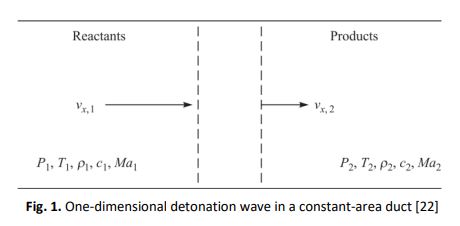Thrust Chamber Dynamic and Propulsive Performance of Biofuels under Detonation Combustion
DOI:
https://doi.org/10.37934/arfmts.92.2.7193Keywords:
Pulse Detonation Engines (PDE), Alternative Fuels, Propulsive PerformanceAbstract
Detonation is a shock wave obtained from the energy that releases after the combustion. Chapman-Jouguet(CJ) theory can be used to identify the behaviour of the detonation in gasses. Pulse Detonation Engines (PDEs) is one of the engines that implement the detonation in its combustion system. The Humphrey cycle is the thermodynamic cycle which is similar to the Pulse Detonation Engines (PDEs). It is the modification of the Brayton cycle where the constant-pressure heat addition process of the Brayton cycle is replaced by a constant-volume heat addition process. The Humphrey cycle can provide the pressure rise combustion by utilizing the shock inside the combustion chamber. Compared to the Brayton cycle, the Humphrey cycle has higher thermodynamic efficiency. However, the detonation process has unsteady combustion which makes it more difficult to handle. The purpose of the study is to calculate the performance of the aircraft by using alternative fuel in the ZND model. An analytical model is started by having the molecular structure of each biofuel and it has been used to determine detonation velocity, Mach number at C-J point, temperature ratio, pressure ratio, density ratio, Brayton and Humphrey efficiency, specific impulse, and specific thrust. In addition, the physical properties of the flow are investigated by changing the initial temperature, initial pressure, and mass flux. The pressure ratio, temperature ratio, and density ratio will all decrease as the initial pressure varies. The variation of mass flux and initial temperature, on the other hand, generates the opposite outcome as the change of pressure. The feasibility of the fuels in the detonation combustion can be known as they show high propulsive performance after the initial condition is changing.
Downloads

































